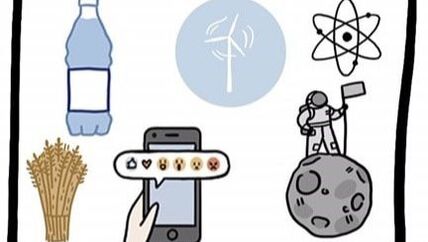 Credit: Belle Pappenfus Credit: Belle Pappenfus We credit science with numerous accomplishments that have stimulated our imaginations and improved our lives. We have reduced hunger and disease, harnessed energy, and purified water. We have landed on the moon and put personal computers in the palms of our hands. With science, we have a clearer understanding of how the world works and we eagerly anticipate the next discovery and innovation. While the growth of science is credited with so much good, we might also ask if any undesirable consequences have emerged. For example, has that computer in the palm of your hand improved your life? The jury is out. However, there are also potential consequences that are far more subtle. One of these is related to how we think about the natural things we are studying. Has science, in successfully providing explanations for how the world works, caused a diminished view of God? If so, why? Can our approach to the natural world put God in the center of creation?  Credit: Belle Pappenfus Credit: Belle Pappenfus Part of this problem is tied to our perception of how God acts. The Bible is filled with reports of spectacular and memorable miracles. The dead are resurrected, the Red Sea is parted, and water is turned into wine. Some people encounter these accounts and dismiss them since no scientific explanation can be identified; others embrace them as examples of God’s power and glory on full display. If you hold that view, it could lead to a subconscious assumption that all of God's actions appear as miracles, but that view is setting you up for all kinds of trouble. A pre-modern mindset was quick to credit God and other metaphysical beings for actions and observations for which we now have scientific explanations. For example, many viewed illness as a test of faith, a punishment for sin or an opportunity for spiritual purification. Weather patterns, growth of crops, and the movement of planets and stars among many other processes, were all attributed to the supernatural. God (or gods) were given credit and blame for much of what happened to those living in the pre-modern world. The Scientific Revolution of the 16th and 17th centuries initiated a transformation of western society's views of nature by providing plausible and verifiable explanations for these and numerous other phenomena. When God and God’s agents appeared to lose their jobs in nature, a new mindset arose that left no action for God or the belief that there is no God at all. Dietrich Bonhoeffer, renowned German theologian, warned us of this problem:  Credit: Belle Pappenfus Credit: Belle Pappenfus "How wrong it is to use God as a stop-gap for the incompleteness of our knowledge. If in fact the frontiers of knowledge are being pushed further and further back (and that is bound to be the case), then God is being pushed back with them, and is therefore continually in retreat. We are to find God in what we know, not in what we don’t know." Therefore, a belief that God is active in the unknown but absent, or even just silent, in what we can describe may train you to think that God plays no active role in your day-to-day life or in the larger world. This could create a mental chasm between you and God. The second unintended consequence of a wholesale devotion to science is related to our source of hope for the world. We should be impressed by the leaps in human well-being made in the past few centuries. We no longer fear certain diagnoses or a season with little rain; we have medication and irrigation to address those problems. There is hope for a future in which all energy production will be renewable and pollution-free. Harvard Psychologist Steven Pinker’s recent book, Enlightenment Now, emphasizes the progress made by humans through science and reason, and implies that we can expect it to continue. If you share his faith in humanity and our ability to independently solve problems, then what need is there to follow Jesus? Christian doctrine holds that humanity, without direction from a divine compass, will devolve into our sinful nature and fail to reach the heights of which we are capable and ultimately create more problems, not fewer. And yet modern atheism often touts the capability of humans to solve our problems without the need of a God. That idea does not come from science, it comes from a worldview that sees humans as sole rulers of the earth. God’s creation is good and we should use science to produce knowledge of its constituent parts, the mechanisms that make it go, and the story of how it gained its current form. However, we should exercise caution to ensure that scientific reason doesn’t convince us that God is not present or active in those parts and mechanisms or that we can rely on our own abilities to save the world from suffering. The good news is that it doesn’t have to. Integrating science and Christian faith can inspire a fuller knowledge of God and draw us closer to Jesus. For this to happen, we need to reconsider the way we think and talk about how God acts so that we create Christian communities that are scientifically literate and have a sense of a divine presence in the systems and entities created by and for God.
0 Comments
|
AuthorDale Gentry Archives
June 2021
Categories |
Connect with us
|
|
Career and Collaborate
Job Openings (coming soon) |

 RSS Feed
RSS Feed